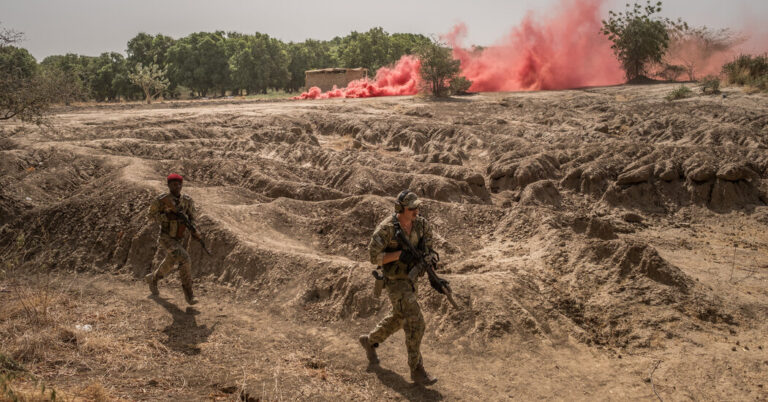The Pentagon will withdraw dozens of special operations forces from Chad in the coming days, the second major blow in a week to US security and counterterrorism policy in a volatile region of Africa. of the West and Central, American officials announced Thursday.
The decision to withdraw about 75 members of the army’s special forces working in Ndjamena, Chad’s capital, comes days after the Biden administration announced it would do so. withdraw more than 1,000 US troops of Niger in the coming months.
The Pentagon is being forced to withdraw its troops in response to demands from African governments to renegotiate the rules and conditions under which American military personnel can operate. Both countries want conditions that better favor their interests, analysts say. The decision to withdraw from Niger is final, but U.S. officials have said they hope to resume negotiations on security cooperation after Chad’s May 6 elections.
The departure of U.S. military advisers in both countries comes as Niger, along with Mali and Burkina Faso, turns away from years of cooperation with the United States and forms partnerships with Russia — or at least explores closer security ties with Moscow.
The Kremlin uses persuasion – and sometimes coercion – to achieve its goals. THE The United States warned the Chadian president last year, Russian mercenaries were plotting to kill him and three of his aides and that Moscow was supporting Chadian rebels massed in the Central African Republic to the south. At the same time, the Kremlin courted sympathizers of Chad’s ruling elite, including ministers and a half-brother of the president.
The imminent departure of American military advisers from Chad, a vast desert country located at the crossroads of the continent, was motivated by a letter from the Chadian government this month in what the United States saw as a threat to end a major security agreement with Washington.
The letter was sent to the U.S. defense attaché and did not directly order the U.S. military to leave Chad, but it cited a special operations task force that operates out of a Chadian military base in the capital and serves as an important hub for coordinating U.S. operations. military training and advisory missions in the region.
Approximately 75 Green Berets from the 20th Special Forces Group, a unit of the Alabama National Guard, are serving in this task force. A handful of other U.S. service members work at the embassy or in various advisory roles and are not affected by the decision to withdraw, officials said.
The letter blindsided and intrigued American diplomats and military officers. He was sent by the Chadian Chief of Air Staff, Idriss Amine; typed in French, one of the official languages of Chad; and written on official General Amine letterhead, two American officials said. This information was not sent through official diplomatic channels, they said, which would be the usual method for dealing with such matters.
Current and former U.S. officials said the letter, which was reported earlier by CNNcould be a negotiating tactic by some in the military and government to pressure Washington for a more favorable deal before the May elections.
U.S. officials said that unlike the departure of U.S. troops from Niger, the withdrawal from Chad could only be temporary while diplomats determine whether a new status of forces agreement could be reached and, if so, whether American military advisers would return to Chad. Barring any last-minute diplomatic developments, U.S. troops are expected to begin leaving this weekend and complete their departure to Germany by May 1, two U.S. officials said.
“As talks continue with Chadian officials, U.S. Africa Command is currently considering repositioning some U.S. military forces from Chad, some of which were already scheduled to depart,” Maj. Pete Nguyen, a spokesman for the U.S. Africa Command, said Thursday. Pentagon.
“This temporary measure is part of an ongoing review of our security cooperation, which will resume after the May 6 presidential election,” Major Nguyen said.
While France, the region’s former colonial power, has a much larger military presence in Chad, the United States also counts on the country as a trusted security partner.
Chad’s presidential guard is one of the best trained and equipped in Africa’s semi-arid belt known as the Sahel. The country welcomed military exercises led by the United States. Officials with the Pentagon’s Africa Command say Chad is a major partner in an effort involving several Lake Chad Basin countries to fight Boko Haram.
“U.S. Africa Command remains committed to building lasting partnerships with Chad and other African countries in the Sahel to address mutual security concerns and help promote a peaceful and prosperous future in the region,” he said. said Gen. Michael E. Langley, command chief. , said during a visit to Chad in January, according to a order declaration.
During the trip, the statement said, General Langley met with General Abakar Abdelkerim Daoud, Chad’s chief of military staff, and other leaders. The discussions focused on regional security challenges and Chad’s efforts to combat violent extremism in the Sahel.
Mahamat Adamou contributed reporting from Ndjamena, Chad.


